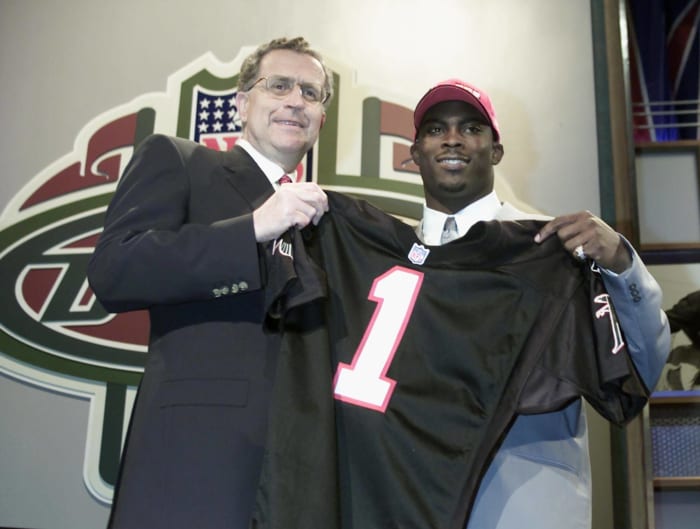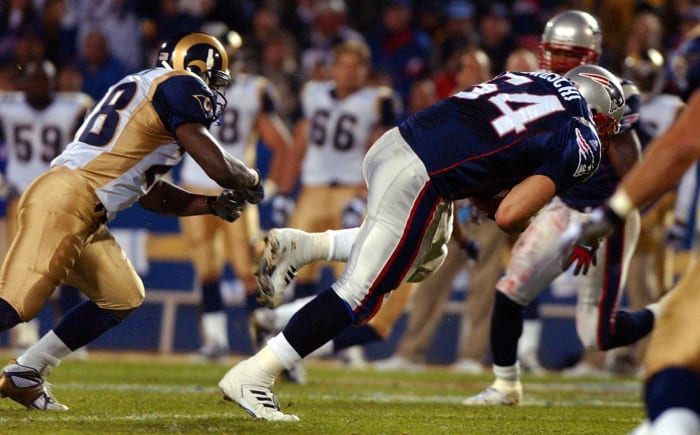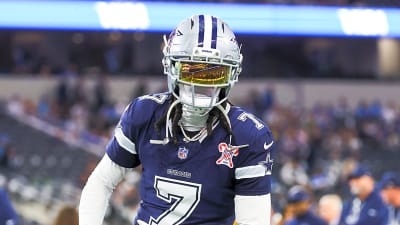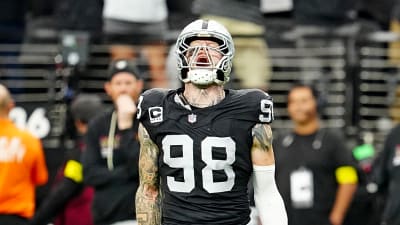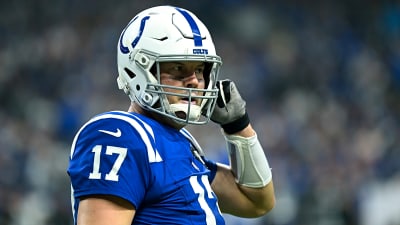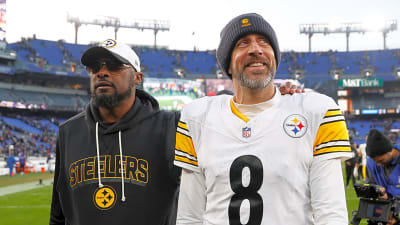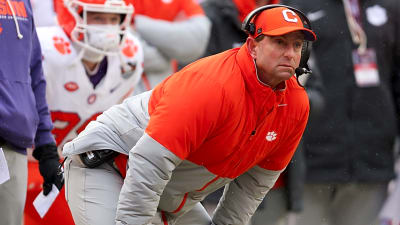Hard to believe it has been 20 years since Tom Brady and the New England Patriots upset the St. Louis Rams in Super Bowl XXXVI. No one could have known at the time that we were witnessing the start of one of the greatest dynasties in sports history and that the lanky second-year quarterback was set on a course to be deemed by many the greatest of all time. Here we are, more than two decades later and Brady finally retired, the Rams have moved back to Los Angeles and Bill Belichick is still toiling away in Foxborough.
So let's re-visit Super Bowl XXXVI, 20 years later.
Gabe Palacio/Getty Images
Let's take a quick look at what the NFL looked like in 2001.
*The NFL was at 31 teams, meaning every week of the season featured somebody's bye week. This was the final year of that setup as the Houston Texans would enter the league for the 2002 season.
*This was the last season of the three-division format. Both conferences went to four four-team divisions with the expansion of the Texans. The NFC and AFC Central were eliminated while the South and North divisions were created in both conferences.
*The realignment meant this was the final season the Seattle Seahawks were a member of the AFC. They would move to the NFC West in 2002.
*Michael Vick was the top overall pick in the NFL Draft.
*Michael Strahan set the single-season sack record. T.J. Watt tied that mark in 2021.
*Vikings lineman Korey Stringer died of a heat stroke during training camp. His passing was the catalyst for major changes in the way the league conducted practices, leading to a better understanding of keeping players hydrated and stopping pressuring players who exhibit signs of heat exhaustion.
2 of 22
Tom Brady's first Super Bowl
Jim Davis/The Boston Globe via Getty Images
Of course, Super Bowl XXXVI is best known for being the moment Tom Brady's legend began. Brady, in his second season, became the starter for the Patriots when Drew Bledsoe suffered a life-threatening injury in a Week 2 loss to the Jets. Brady would go 11-3 as a starter and keep the job even as Bledsoe was cleared to play again. He threw for 2,843 yards, 18 touchdowns, and 12 interceptions in 2001 and entered the postseason as New England's starter.
3 of 22
But Brady almost didn't start the Super Bowl
Jim Davis/The Boston Globe via Getty Images
Brady did start the final 14 games of the regular season and both of the Patriots' games in the AFC playoffs. But he suffered an ankle injury in the 24-17 win over the Steelers in the AFC Championship game. Bledsoe came in to finish that game, including a touchdown pass right before halftime. So in the days leading up to Super Bowl XXXVI, Bill Belichick was non-committal to who would start in the game. No starter was named when the media day rolled around, making for a juicy storyline among reporters to Pats players. Even St. Louis Rams head coach Mike Martz felt the veteran Bledsoe would be the guy. Obviously, Brady ended up being named the starter.
Brian Bahr/Getty Images
Tom Brady's story has become the sixth-round pick who took advantage of an injury to take the torch as the best quarterback in the league. In 2001, Kurt Warner was that guy. He went undrafted and not in the league to take advantage of an injury to become the best quarterback in the league. Warner came out of nowhere in 1999 to win league MVP and brought the Rams their first Super Bowl title. He was the league's best passer and won his second MVP heading into Super Bowl XXXVI. He was the first quarterback to win a Super Bowl in his first year as a starter (Tom Brady would do it as well in Super Bowl XXXVI). He would end up playing in one more Super Bowl but did it with the Arizona Cardinals. All three Super Bowls Warner played in went down to one of the final plays of the game.
Twenty years later, Warner is a Pro Football Hall of Famer and had a movie released about his life in 2021 called American Underdog: The Kurt Warner Story.
5 of 22
Rams beat Patriots in regular season
Jim Davis/The Boston Globe via Getty Images
The Super Bowl was the second time the Rams and Patriots would face-off that season. In Week 10, the Rams went into Foxboro Stadium and beat New England in a turnover-heavy game, 24-17. Kurt Warner would throw for 401 yards, three touchdowns, and two picks in the win. The Rams would become 8-1 with the victory, while the Patriots dropped to 5-5. Warner would throw a pick-six in that game (just as he did in the Super Bowl)
New England wouldn't lose again that season, winning their final six regular-season games, two AFC playoff games, and Super Bowl XXXVI.
6 of 22
Patriots 3rd straight Super Bowl in the Superdome
Mario Tama/Getty Images
Hard to believe it at the time, but this was just the third Super Bowl appearance for the Patriots. The Pats were previously in Super Bowl XX (loss to Chicago Bears) and Super Bowl XXXI (loss to Green Bay Packers) -- and both games were played in the Louisiana Superdome. Super Bowl XXXVI against the Rams was also held in the Superdome, the sixth time the Super Bowl was played in that building. Due to Hurricane Katrina's effect on the New Orleans area and the Superdome itself, the game has only been held there just once since (Super Bowl XLVII), though it is scheduled to host Super Bowl LIX in 2025.
7 of 22
First Super Bowl post 9/11
M. Caulfield/WireImage
One of the predominant narratives surrounding the Super Bowl was that it was the first one held after the terrorist attacks on September 11, 2001. At the time, the nation was extremely concerned another attack could take place anywhere, and the preeminent sporting event in the United States was deemed a prime target for terrorists. Needless to say, security was at an all-time high as there was a strong military and police presence inside and outside of the Superdome. Security lines we have become so accustomed to were stretched hundreds of feet. Fences and concrete barriers surrounded the stadium. Items that fans used to be able to carry into games were confiscated at the gate. It was the first Super Bowl in the new reality of the tragedy of 9/11.
8 of 22
First Super Bowl held in February
JEFF HAYNES/AFP via Getty Images
9/11 had other effects on Super Bowl XXXVI -- such as the fact the game was held on February 3rd. The NFL postponed all games for Week 2 and rescheduled them at the end of the season. That meant the playoffs were pushed back a week, which meant the Super Bowl had to be pushed back as well. The NFL initially didn't have an off week scheduled between the conference championships and the Super Bowl because the league began its season after the Labor Day holiday. So instead of the game happening on January 27th, it was moved into February for the first time in its history. That made Super Bowl XXXVI the latest Super Bowl to date but turned into a permanent decision moving forward. After Super Bowl XXXVII stayed in January the following year, every Super Bowl since has been played in February.
9 of 22
They had to bump the National Automobile Dealers Association out of Super Bowl week
Sean Gardner/Getty Images
If moving the Super Bowl and all of its corresponding activities and events for the week isn't enough of a challenge, telling people who already have their own activities and events scheduled for the date you want is also a challenge. Especially when those people are the National Automobile Dealers Association. NADA scheduled their convention for February 3rd at the Superdome and needed to be "bought out" in order to move the date. The Super Bowl would move to February 3rd while the NADA convention would occupy the Super Bowl's original scheduled date, January 27th. In the deal, the National Automobile Dealers Association received the cash and prizes you'd expect the NFL to fork over (reportedly $7.5M) as well as some advertising spots during some NFL games during the season and playoffs.
10 of 22
Super Bowl logo changed to red, white and blue
Focus on Sport/Getty Images
The NFL decided to change the Super Bowl logo due to the groundswell of patriotism in America and around the league. The original Super Bowl XXXVI logo featuring a Mardi Gras-inspired feel was ditched and a red, white and blue logo superimposed on a map of the contiguous United States was created in its place.
11 of 22
Patriots eschewed individual player introductions
Brian Bahr/Getty Images
One dramatic pregame change was the Patriots' decision to not be introduced individually but instead as a team. To that point in Super Bowl history, one side of a team's starting roster (typically the offense) was introduced onto the field in a basketball-style format. St. Louis, the road team in this Super Bowl, had their offense introduced one-by-one. The Patriots, who really lacked any offensive stars, decided to be introduced as a team as they ran on the field. That gave the underdogs an even bigger spike in support from fans who hadn't already picked a team to pull for.
The NFL initially balked at the idea of Belichick and the Patriots doing this, but the team stood firm and their request was granted. Ever since that game, the individual introductions have gone by the wayside.
12 of 22
U2's halftime show
M. Caulfield/WireImage
While the game was one of the better Super Bowls in history, its halftime show is also among the most remembered. U2 played just three songs during their set, but all three were impactful and left the audience emotional. After singing "Beautiful Day" and "MLK", the band performed "Where the Streets Have No Name" while the names of the victims of the September 11th attacks were projected on a sheet that hung from the Superdome rafters and reached the stage. U2 was not originally scheduled to perform at the Super Bowl (more on that in a minute) but was selected to reflect the tone the league wanted from its premiere event.
13 of 22
Janet Jackson was supposed to perform instead, but rescheduled
KMazur/WireImage
Janet Jackson was originally slated to perform the Super Bowl XXXVI halftime show, but the league felt they wanted a more serious tone from its act instead. Her replacement, U2, had one of the best halftime shows in Super Bowl history and delivered the kind of performance the league wanted and a grieving nation needed. Janet Jackson would reschedule for two years later (Super Bowl XXXVIII) in one of the most infamous moments in pop culture history and the term "wardrobe malfunction" entered the lexicon.
14 of 22
What happened to the Greatest Show on Turf?
Focus on Sport/Getty Images
Looking back on Super Bowl XXXVI, sometimes we forget just how the roles were reversed for these two franchises. The St, Louis Rams were in the middle of a five-year stretch of dominance where their offense ... dubbed the "Greatest Show of Turf" ... was nearly unstoppable. They set league records during this period and produced three consecutive NFL MVPs (two by Kurt Warner, one by Marshall Faulk). Besides Warner and Faulk, the Rams boasted receivers Issac Bruce, Torry Holt, Ricky Proehl, Az-Zahir Hakim, and Hall of Fame tackle Orlando Pace. That core won Super Bowl XXXIV over the Tennessee Titans two years earlier.
In 2001, the Rams led the league in total offense, passing yards, passing touchdowns, and rushing touchdowns. The Patriots defense did a wonderful job being physical with the Rams receivers and held the Rams to just three points over the first three quarters. The game's highlight to that point was Ty Law picking off a Warner pass and returning it 47 yards for a touchdown.
15 of 22
Tebucky Jones' scoop and score late that was called back
Barry Chin/The Boston Globe via Getty Images
While the Patriots did a fine job bending but not breaking all game long, the Rams were driving early in the fourth quarter to try to erase a 17-3 deficit. On 4th-and-goal on the New England 3-yard line, Warner scrambled and saw an opening to run for a touchdown but was hit at the 2-yard line and fumbled. The Patriots' Tebucky Jones picked up the ball and raced 98-yards for a touchdown that looked to ice the improbable victory. Jones' return at the time would have been the longest non-special teams play in Super Bowl history (Desmond Howard's 99-yard kickoff return in Super Bowl XXXI was the longest play of any kind to that point).
Except there was a flag on the play. Linebacker Willie McGinest was called for holding Marshall Faulk ... who was Warner's initial read on the play. The Rams took over with a 1st-and-goal on the Patriots one-yard line and would score a touchdown on a Warner run two plays later. What was nearly a 24-3 Patriots lead turned into a 17-10 nail-biter in a matter of minutes.
16 of 22
Rams amazing late comeback
Al Bello/Getty Images
The Warner run capped off a 12-play drive 77-yard drive that began St. Louis' comeback. After forcing New England to a three-and-out, the Rams drove down to the Patriots' 36-yard line before a sack forced a punt. After another Patriots three-and-out, the Rams got the ball at their own 45-yard line and proceeded to look like the Greatest Show of Turf. Warner completed an 18-yard completion to Hakim and an 11-yard pass to Yo Murphy before a 26-yard touchdown pass to a wide-open Proehl (who made a nifty juke on Tebucky Jones). Three plays and the game is tied 17-17 with 1:21 left in the game.
The 14-point comeback was the largest comeback to tie or take the lead in Super Bowl history until the Patriots' 25-point comeback in Super Bowl XLI.
17 of 22
Brady's 81-second GW drive (which Madden said they should've knelt)
Jim Davis/The Boston Globe via Getty Images
After the Rams tied the game came the drive that began Brady's legend. As the Patriots began their drive on their own 16-yard line, Fox's John Madden was adamant that they should just run the clock out and go into overtime. The Rams had the momentum, the Patriots just had two three-and-outs and New England has zero timeouts with bad field position. With an inexperienced quarterback at the helm, Madden felt that the Patriots risked doing something "stupid". Fox kept showing graphics about how there had not been an overtime Super Bowl.
After a five-yard completion to J.R. Redmond, Madden said, "I don't agree with what the Patriots are doing here. I would play for overtime." Another completion to Redmond for 8 yards. Brady clocks the ball. An 11-yard pass to Redmond, who got out of bounds to stop the clock with 33 seconds remaining. "Now I kind of like what the Patriots are doing," Madden comments. After an incompletion under pressure, Brady found Troy Brown for a 23-yard catch and run. Brady dumped the ball to Jermaine Wiggins to the Rams 30-yard line, clocked it with :07 remaining, and Adam Vinatieri comes in to end it.
18 of 22
Adam Vinatieri's kick
Sylvia Allen/Getty Images
As you probably know, Adam Vinatieri came in and nailed the 48-yard field goal for the win ... the first time a Super Bowl had even been won on the final score of the game. It was the Patriots' first Super Bowl win, but it certainly wasn't the last (they've won six now). It isn't even the last time Vinatieri won a Super Bowl on a game-winning kick as the clock expired -- he did it two years later against the Carolina Panthers in Super Bowl XXXVIII.
This kick was part of a remarkable run by Vinatieri. He hit the game-tying 45-yard field goal in blizzard conditions in the Patriots' Divisional round. He would win the game in overtime with a 23-yarder in the snow. Vinatieri would become the NFL's all-time leading scorer during his 24-year career. He also leads in field goals made, overtime field goals made, and postseason points and his 44 consecutive made FGs is a record. He won three Super Bowls with the Patriots and another with the Indianapolis Colts.
One oddity about the kick is that it looked as if there were two seconds remaining when the kick hit the back of the net and the officials signaled it good. The clock continued to run, however, and the game was over.
19 of 22
Brady didn't deserve Super Bowl MVP
Sporting News via Getty Images
Tom Brady was named the MVP of Super Bowl XXXVI, his first of a record five Super Bowl MVP awards. But did Brady really deserve the honor that night? His stats were 16-of-27 (59%) for 145 yards and a touchdown -- hardly numbers that an MVP quarterback would have. Sure, Brady isn't the first nor the last winning quarterback who won a Super Bowl MVP because there really wasn't any clear standout, but this may be have been one of the biggest reaches.
The award likely should have gone to a defensive player -- namely Ty Law, whose pick-six in the second quarter completely changed the trajectory of the game. Law also was an integral part of Belichick's game plan that slowed down the Rams potent offense. So were Otis Smith (who picked off Warner as well) or Willie McGinest. The story of the game on that night and 20 years later is how the Patriots defense stifled The Greatest Show on Turf and the iconic play from the game (aside from Vinatieri's reaction to his game-winning kick) was Law running down the sideline for his touchdown.
Brady wasn't even the best offensive player that night. Antowain Smith ground out 92 yards on 18 carries (a 5.1 average). Brady may be the GOAT, but he wasn't on that night.
20 of 22
AFC East's 8-game Super Bowl losing streak ends
TIM CLARY/AFP via Getty Images
The Patriots' win ended an eight-game losing streak by AFC East teams in the Super Bowl. The last time an AFC East team won the Super Bowl was way back in Super Bowl VIII when the Miami Dolphins beat the Minnesota Vikings to complete their back-to-back championships. Since that win in January 1974:
XVII: Dolphins lost to Redskins
XIX: Dolphins lost to 49ers
XX: Patriots lost to Bears
XXV: Bills lost to Giants
XXVI: Bills lost to Redskins
XXVII: Bills lost to Cowboys
XXVIII: Bills lost to Cowboys
XXXI: Patriots lost to Packers
The AFC East has gone 6-3 in Super Bowls since the Patriots beat the Rams, with New England being the representative in all nine games.
21 of 22
Largest Super Bowl upset since the merger
Ezra Shaw/Getty Images
The Patriots entered Super Bowl as a 14-point underdog, making their win over the Rams the largest upset since the NFL-AFL merger. The New York Jets beating the Baltimore Colts in Super Bowl III as an 18-point underdog remains the biggest upset in Super Bowl history. Three years later, the Patriots would fall victim to the third biggest upset in a Super Bowl as they lost to the New York Giants as 12.5 point favorites.
22 of 22
Pat Summerall's final Super Bowl broadcast; Madden's last with Fox
Frank Micelotta/ImageDirect/Getty Images
Super Bowl XXXVI was the final Super Bowl broadcast of Pat Summerall's career. The game was his 16th Super Bowl television broadcast -- still a record -- and was meant to be his retirement from the NFL. He would un-retire and stay on for the 2002 season and paired with Brian Baldinger. Due to Summerall's initial retirement, John Madden would leave Fox to join Al Michaels on ABC's Monday Night Football. After calling mostly Cowboys games, Summerall would retire following the 2002 season, though he came back to the booth on a few occasions. He called several games for ESPN in 2004 in place of an ailing Mike Patrick and would be an emergency fill-in at Fox for a game in 2006 and another in 2007.
An odd part of this legacy is how reserved Summerall's call was on one of the most memorable plays in NFL history ... in one of the biggest Super Bowl moments. In a pregame flashback just before Adam Vinatieri's field goal attempt, he misread a practice kick as a miss. As they went back to live-action, he then undersold the gravity of the moment as Vinatieri's final kick split the uprights and the Patriots walked off as Super Bowl winners -- the first walk-off score in Super Bowl history.
Summerall would pass away in 2013 at the age of 82. Madden passed away in December 2021.
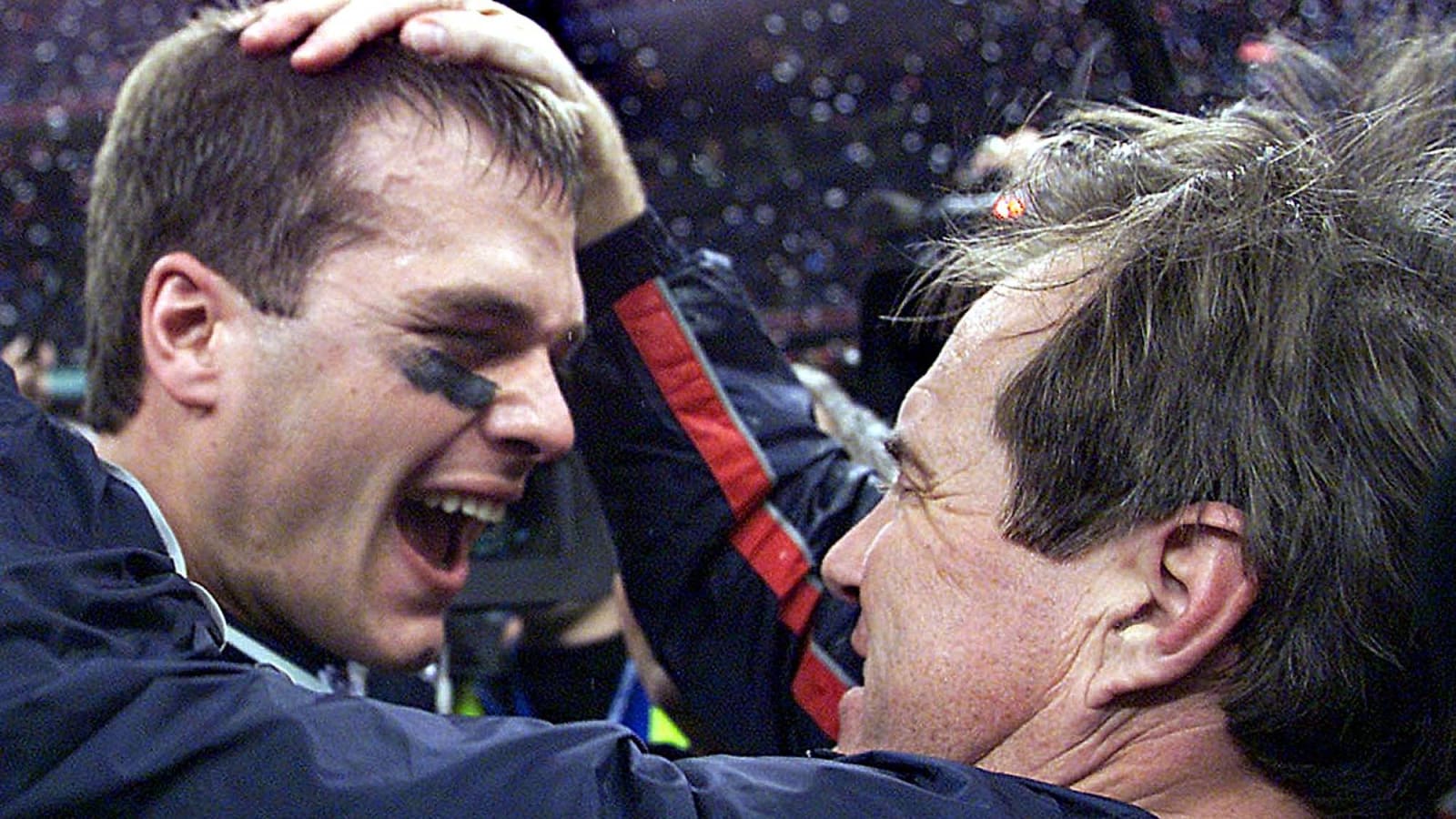
 +
+
